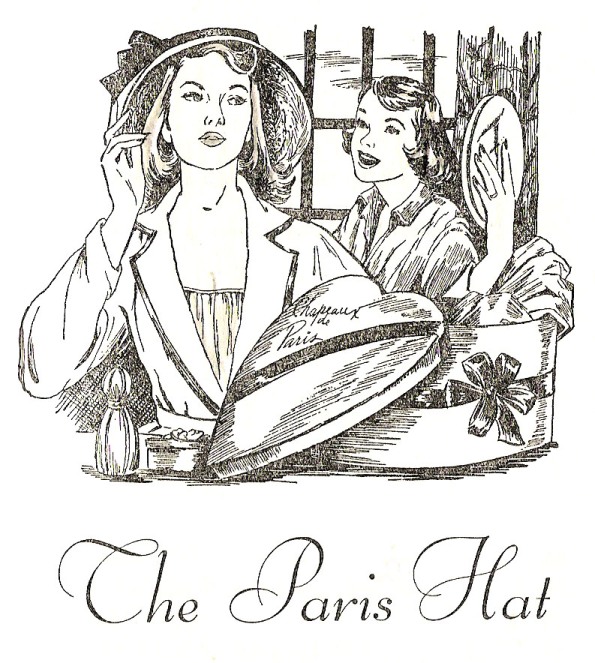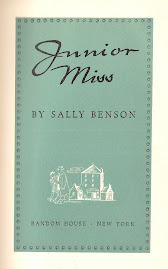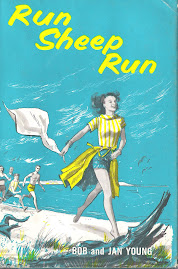Title: A Walk in the Moonlight
Author: Eve Bennett
Publisher: Julian Messner, 1959
Setting: Bennett's trademark Denver
Provenance: ILL, currently the property of St. Francis University Library, Loretto, Pennsylvania
Fun: nosy neighbors; waitressing in a diner; quitting school
Quote: "The clothes, smelling clean and fresh, blew lazily in the breeze, and Mary was conscious of a job well done. Suddenly her eye caught a movement at the dining room window of the house next door. That meant that old Mrs. McDrey was peering from behind the lace curtain, looking for tattletale gray in Mary's wash, counting the towels and sheets, spying out every worn spot in every piece."
Sorry for the long gap. I got the bright idea of asking for some books through inter-library loan instead of pursuing them on Ebay and other sites. The first book I asked for came through quickly, but the next two didn't show at all, and when I asked at the library I was told my order had been cancelled, for no apparent reason. They put the request through again and this week I got A Walk In the Moonlight.
Eve Bennett also wrote Concerning Casey, I, Judy and April Wedding, all books set in Colorado (mainly Denver) and all about girls going through unexpected turmoil -- sometimes with a hint of sexual scandal -- and emerging stronger. A Walk in the Moonlight's starting point is a variation of the 19th century shibboleth in which a couple who stay out all night when their buggy breaks down have to get married because the woman's reputation is ruined. Mary Munday and faithful, if not very passionate, boyfriend Andy blow a carburetor on a mountain road and have to hike home. Nosy neighbor Mrs. McDrey sees Mary strolling in at six a.m. and tells another nosy neighbor and before you know it, Mary's friend, Tessie, is forbidden to associate with her. The girls at school talk, too, and soon Andy stops coming around.
This incident -- which is made believable, even for the 1950s -- is really just a small part of the story. Mary has a supportive family and plenty of friends and the reader can't help but think that the gossip doesn't amount to much. But Mary, like a lot of Bennett's heroines, is angry at the basic unfairness of life. She quits school and goes to work as a waitress in a grease-pit diner, and that's where the drama of the book unfolds.
The rest of A Walk in the Moonlight is Mary working through her emotions, with the help of her father and a new boyfriend, Mike Aldo. Here, the era in which is was written begins to tell. Mike has a tendency to grab Mary while subjecting her to "supportive" tirades which are supposed to bring her out of her self-pity. As a result of the speeches, Mary does indeed go back to school and makes plans for college. But in the final scene, after Mike tells Mary he's going to marry her someday, he suggests they stop seeing each other because in the meantime they might be...you know...tempted. (The words "clean" and "fine" are used a great deal in this scene.)
I can't help think this was a little old-fashioned, even for 1959, and it introduces a note of conflict to what is supposed to be an uplifting ending. I guess ten years later, when Mary gets a divorce from Mike (and she will), she'll have her waitressing experience to fall back on.
Now this sounds sort of bitter. It's always been my aim in this blog not to criticize books merely for demonstrating the values of their time. I don't believe the current era is inherently superior to the 50s; in some ways we're worse off. But I do object to a book like A Walk in the Moonlight, a book in which much care has been taken to create a realistic world with realistic conflicts, crushes itself down at the end into something "clean" and "fine."
It's all about...popular girls...rec rooms...summers at the lake...dates with wealthy, thrill-crazy boys...black-market antiques...small town political corruption...and finding your true path in life. The Paris Hat considers the sometimes frothy, sometimes serious world of novels for teenage girls from the 1950s and 60s.
Thursday, September 1, 2011
Subscribe to:
Post Comments (Atom)











No comments:
Post a Comment